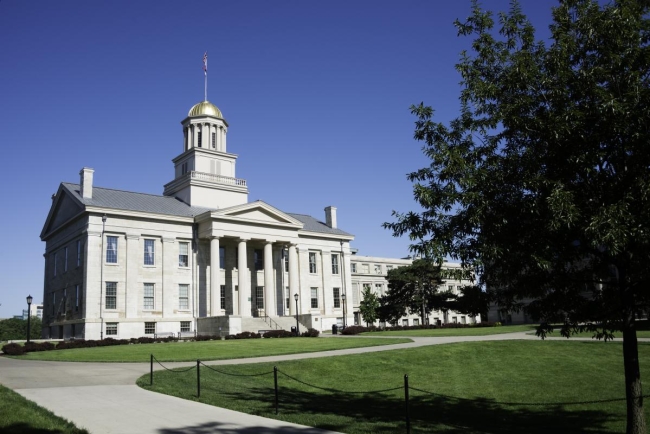You have /5 articles left.
Sign up for a free account or log in.

University of Iowa
dosecreative/iStock/Getty Images Plus/Getty Images
A federal appeals court ruled Monday that University of Iowa administrators can be held personally liable and sued for damages due to their actions deregistering a Christian student group that denied a leadership position to a gay student.
The case involves a student group called Business Leaders in Christ, whose members believe that same-sex relationships are “outside of God’s design.” After the group denied an executive leadership position to a gay student in 2017 on the stated grounds that the student “disagreed with, and would not agree to live by [BLinC’s] religious beliefs,” the university began a process that ultimately led to the revocation of the group’s status.
BLinC sued and, in a 2019 decision that alarmed advocates for LGBTQ+ students, a district court judge held that the university selectively enforced its Human Rights Policy and violated BLinC members’ constitutional rights to free speech, free association and free exercise of religion. The university did not appeal the judge's holding that it infringed on the BLinC members' First Amendment rights.
Rather, at issue in the appeal was whether the three individual Iowa administrators named as defendants could be personally liable and sued for damages, or whether they are shielded by qualified immunity, a legal doctrine that grants government officials immunity from civil lawsuits except in cases where their conduct violates “clearly established statutory or constitutional rights of which a reasonable person would have known.”
In a decision that hinged on an assessment of whether the rights at issue were “clearly established,” the U.S. Court of Appeals for the Eighth Circuit partially reversed the ruling of the district court, which had granted the administrators qualified immunity. The appeals court held that the administrators can be held personally liable in relation to the students’ free expression and expressive association claims, but not in relation to claims related to free exercise of religion.
In a dissenting opinion, Judge Jonathan Kobes went even further, holding that the officials should also be liable for the free exercise claims.
“The law is clear: state organizations may not target religious groups for differential treatment or withhold an otherwise available benefit solely because they are religious,” he wrote. “That is what happened here. The individual defendants may pick their position: they are either plainly incompetent or they knowingly violated the Constitution. Either way, they should not get qualified immunity.”
University of Iowa administrators said in a brief, one-sentence statement that they are "currently reviewing the decision" and the university's options.
The university is separately facing a substantially similar lawsuit involving another Christian group, the InterVarsity Graduate Christian Fellowship. In September 2019, a district court judge ruled that the university discriminated against the group when it revoked its status, and further found that the individual administrators involved could be held personally liable for damages. The university’s appeal of the ruling is pending before the Eighth Circuit Court of Appeals.
In both cases the student groups are represented by the Becket Fund for Religious Liberty, a nonprofit legal firm.
“When university officials continue to brazenly violate the First Amendment, it’s really important that they be held personally liable,” said Eric Baxter, vice president and senior counsel for the Becket Fund.
He added that holding officials liable can serve as an example to others and make them think ahead when making decisions that could infringe on student rights.
“We hope other universities will take heed and treat all university groups on equal terms,” Baxter said.
William Thro, general counsel at the University of Kentucky, said on the one hand it's very unusual for a public university administrator not to get qualified immunity. But on the other hand, the law around treating student groups the same with respect to recognition, funding and access to facilities is clearly established, he said.
"I think there is an increasing reluctance on the part of courts to grant qualified immunity," Thro said. "There is a feeling that too many people are getting away with constitutional violations and are getting off scot-free because yes, you violated somebody’s rights, but we’re going to say that the law was not clearly established. So I think there is some reluctance to extend qualified immunity and that’s particularly true among certain conservative judges."
"The second trend that I see is not too long ago there was almost total deference to the judgment of higher education administrators," Thro continued. "Even if they found a constitutional violation, as they sometimes did, it was like, 'Oh, they’re doing the best they can.' I think we are seeing a trend where the courts no longer defer to academia at all. That is a major shift in the law."
Lilah Burke contributed reporting to this article.








